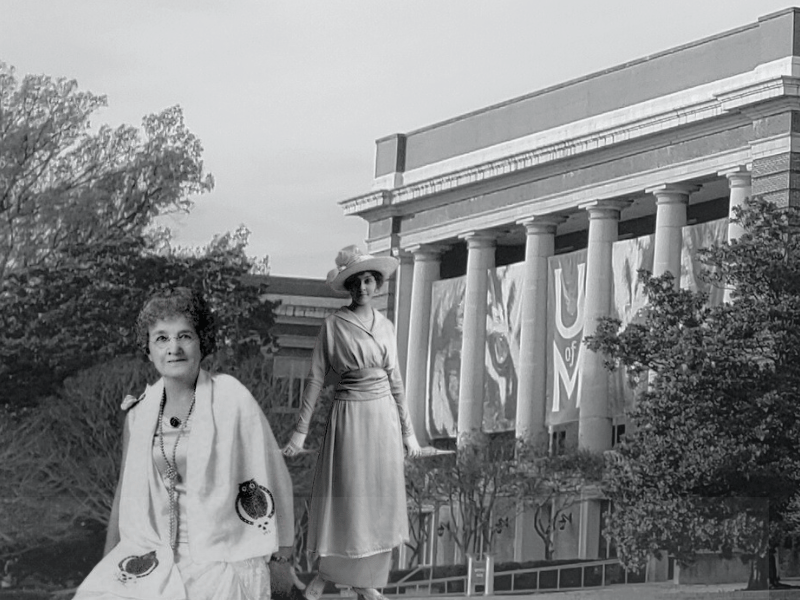He laid two copper Buffalo nickels on the dressing table beside her hand.
“That should be more than enough to get you to Normal Station and back.”
She looked up at his reflection in the beveled mirrors, his boyish smile floating just above her right shoulder. She answered the warmth of his gaze with her own and turned to grasp his hands.
“Now Mr. Weathersby, you know you do not have to do that,” said Lillie. “Lula said they would be more than happy to pick me up along their way.”
He pulled her up toward him, wrapping his arms around her delicate frame. “I know,” he said. “But I also know how you enjoy the ride on the streetcar, even though I am still unsure how I feel about you riding unescorted.”
She laid her head upon his chest, listening for the soft heartbeat that often calmed her nerves. Her response was the perfect mix of sass and respect. “You may have to let go of your traditions, Mr. Weathersby,” she teased. “I have heard women are even working in the factories now, doing men’s work for them. Surely, we can be entrusted with a trolley ride alone.”
He looked down and lifted her chin with his hand, meeting her eyes with seriousness. “You know I could not live with myself if something were to happen to you. I promise this is more about my concern for your safety than any desire to restrict your independence.”
She examined his face, searching. She found the same weary sadness in his eyes that had become a constant presence in the last year. “Are you sure? I know we are doing well compared to others, but with the difficulties this year at the exchange . . . should we be more frugal? I heard the war is growing more intense. This isn’t something I have to do. I could always—”
“But it is something you want to do. And I want you to have everything you have ever wanted.” He paused and stared above her head into nothing. “And it is something you need to do. Maybe it can take your mind off—” he held his breath as he searched for the words.
She absorbed the sorrow in his voice as she twisted away from him. She moved to the armoire, gently opened the ornate wood door, and removed a light gray wool serge coat. As she slipped the coat over her ankle-length lavender dress, he joined her, placing his hands upon her shoulders.
He tried to lift the mood out of the heaviness that fell upon the room. “And what do you know of the war that directs my days, darling? Have you been reading my Saturday Evening Post again?” he joked.
The tension drained from her, and she allowed the sadness to pass her by this time. She reached for the hatbox on the bureau and removed the lid. As she placed a large-brimmed straw hat with a white silk bow upon the piles of her upswept auburn curls, she retorted, “Well, I have to read something. How else will I learn about the world?”
“Ahh, my modern woman. It sounds as if the ladies of the Nineteenth Century Club are rubbing off on you.”
“Maybe I am rubbing off on them,” she said with a wink as she walked back to the dressing table.
“In all these trips, have you made any progress? Are they willing to take you on?”
Lillie lifted the coins from the opulent wood surface, unsnapped the top of her leather purse, and dropped them in. She tucked the purse under her arm, reached for her gloves, and glanced once more in the mirror. “No, she has not said yes yet, but I have a feeling today is the day.”
***
Lillie paused to catch her breath, leaned on her parasol, and peered up at the intimidating structure as she shielded her eyes with her hand. It was not a short walk from the depot to the columns that towered above her, nor an easy walk up the many concrete steps that led to them in this impractical, narrow skirt.
As she did each time she was here, she admired the grandeur of the colossal building. It appeared out of place in the barren fields, with only two slightly smaller buildings nearby. Fields that once produced the same cotton that the war now labeled as contraband. The West Tennessee Normal School stood as a beacon of a better future for hundreds of young adults seeking higher learning, and she wanted to be a part of that future. She entered the administration building and began her ascent again. Whoever thought of putting the new library on the third floor had never worn this dress.
She reached the landing, feeling frazzled and unprepared despite her rehearsal of the encounter all morning. She stepped through the entry with her head down, prepared to ask humbly. Within seconds, she almost ran over the very person whose attention she came to seek. Lillie stood now face to face with the formidable librarian the students called “Mother Mynders.”
“You again?” the woman exclaimed as she spun around and hurried the other way. She bellowed over her shoulder as she grabbed books from the counter and kept walking. “Didn’t I make myself clear? We are not looking for any help.”
Lillie followed her through the stacks and rows, trying to keep up with her unyielding opponent. She was ready to be as persistent as necessary. “Yes, I heard you. And I will repeat what I have said.” Lillie caught her own sharpness and readjusted to a softer tone. “I know the school is struggling for both space and help. I know student workers can only do so much, and I know there is no more money for books except what is donated. I am asking now, and I will continue to ask again and again until the answer is yes. Please allow me to help.”
Mrs. Mynders stopped at the end of the aisle and turned back to Lillie, chin raised, standing firm as a stone wall. “Why? Why is it so terribly important for you to work in this library? Why not go to Cossitt? Why here?”
Lillie hesitated under the glare of the older, stern woman, feeling uneasy about her venture that seemed so sure a few moments before. Maybe her friends were right. Maybe she should just stay home and be content to be a good wife and good community club member. Maybe her charity should end at her donations. Maybe she was meant to only run a household. The sadness washed over her again, returning like an oncoming wave she had turned her back to. No, I must do this. I cannot stay alone in that house any longer. I cannot paste this fake smile on my face anymore, pretending my life matters the way it is right now. I must leave some legacy behind.
The panic within the idea of turning back pushed her forward. Lillie blurted out her answer in rushed words of run-on urgency. “Because I need to make a difference, and I can think of no better way to use my skills than to help these young adults learn to teach others because I cannot handle one more minute of loss and I just must find a way to give something back.”
Mrs. Mynders stood frozen, staring wide-eyed at this woman’s unforeseen flood of words. Lillie dropped her head, embarrassed by her sudden outburst. The silence filled the space between them as if time was standing still.
“Tell me about the loss,” Mrs. Mynders said, unexpectedly gesturing to a table nearby as she left the stack of books on the end of a shelf. She waited for Lillie to sit, and then pulled out a heavy wooden chair and sat across from her, hands folded on the table. Lillie removed her gloves and laid them across her lap as she began to speak.
“This year . . . it has been hard. We lost my brother two weeks after they shuttered the Cotton Exchange—he was the reason we moved to Memphis from Mississippi. My husband was a doctor back home, but my brother brought him on as a cotton broker after my mother-in-law passed, assuring him it was the ideal job.” Lillie paused. “My brother was rushing home in a panic from New York—I imagine upset about this ideal job of his—and had a stroke on the train.” Lillie paused again and met her gaze.
“Go on,” the school’s matriarch encouraged.
“And then . . . a few months later . . . there was the baby.” She felt her voice crack on the last word as she fought back tears. Lillie noticed a shift from across the table. “Our only chance in eight years of marriage. I never even felt a kick.” The tears gave way. “The doctors said it was not meant to be for us to have children . . . ever.” She took a white linen handkerchief from her purse and dabbed her eyes.
“I lost a daughter.”
Lillie’s head snapped up, and she stared at Mrs. Mynders. “I didn’t know,” said Lillie.
“That surprises me, considering how many other things you seem to know about our school.” The librarian stood, walked to the window, and looked out at an E-shaped building across the way. “Her name was Elizabeth.”
“I am so very sorry,” whispered Lillie.
“Twenty-one months later, my husband followed her in death. He was the president here. He started this school. It was his dream.” She pivoted away from the view, clasping her hands in front of her and lifting her head as if in defiance. “I stayed on and pursued the creation of the library. I had to. What is a school without a library? I had to finish what he started.”
“Then you understand!” Lillie rushed over to her, stopping short of grasping her hands. “You understand why I must do this? I cannot sit in that house or in those club meetings anymore. I want to be here. I can do it. I know the decimal system and even use it in my own private library. I have read the latest of everything. Mind you, I am not a dime novel kind of woman. I—”
“Okay.”
“I can type and write and petition and beg. I have even been on committees for our voting rights. I am assertive and dependable and—”
“I said, okay,” Mrs. Mynders said firmly. “You can help, as long as you stop that incessant talking.”
Lillie plastered a silent, teeth-showing smile on her face.
“When can you start?” said Mrs. Mynders.
“Now is good,” said Lillie, still smiling.
Mrs. Mynders squared her shoulders and inhaled in a deep breath. Her voice returned to the stern tone from their previous conversation. “Follow me and keep up,” she said as she started walking away, grabbing the stack of books from the end of the shelf. Lillie grabbed her things and followed. “Since we finally convinced the state of the need just last year, there have been 4,000 volumes donated. Of course, they only provided $1000 for its start, but we made do. At least it freed up our staff from all the time spent chaperoning our students to other nearby libraries.”
Lillie saw a flicker of excitement in the woman’s eyes as she tended to the training of her new apprentice. Her nervousness faded as she gained respect for her teacher and rejoiced in the potential of this new journey. She never imagined the woman holding the access to Lillie’s opportunity for peace had also been looking for peace of her own. For the first time since she moved to this city on the bluff, she felt the satisfaction of a purposed plan. She knew right away that together, turning their pain into passion, she and her new mentor would change history.








